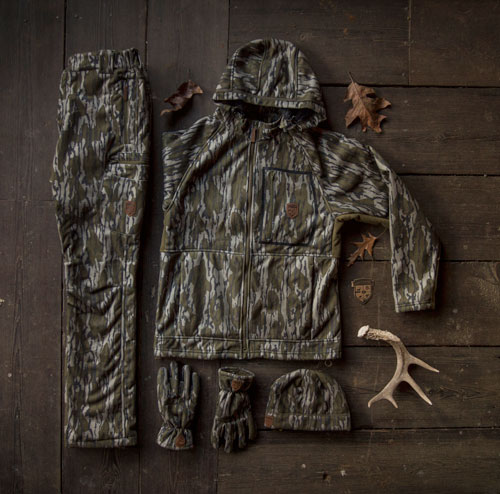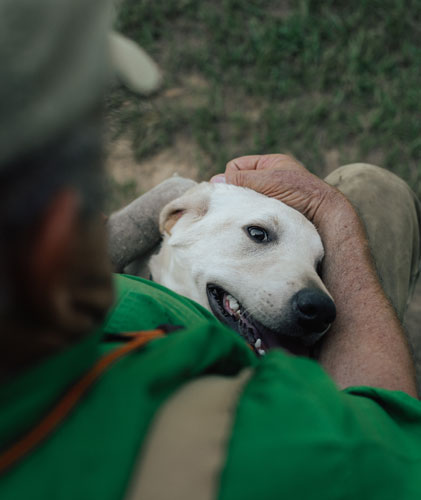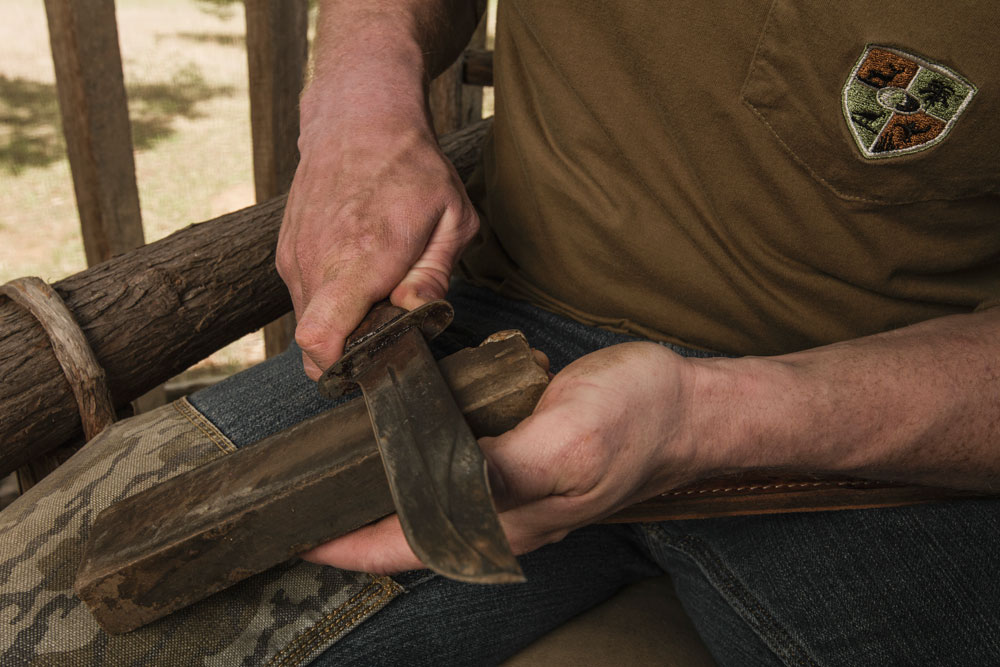 It’s the end of the day—you shot your game and are all finished with your hunt. You, your group, and your hunting dogs are tired and adrenaline is running high as you pack up your gear at the end of the day and look forward to another hunting trip in the near future. It’s important before heading out for your next hunting trip that all your gear is in perfect working order. Here are a few helpful tips for taking care of your tools—including your hunting dog—and properly storing your gear when the hunt is over.
It’s the end of the day—you shot your game and are all finished with your hunt. You, your group, and your hunting dogs are tired and adrenaline is running high as you pack up your gear at the end of the day and look forward to another hunting trip in the near future. It’s important before heading out for your next hunting trip that all your gear is in perfect working order. Here are a few helpful tips for taking care of your tools—including your hunting dog—and properly storing your gear when the hunt is over.
Inspect and wash your clothing.
As hunters, it’s not uncommon for us to get very dirty. Between being out in the woods and sweating in the hot sun for hours throughout the day and the blood, dirt, and other materials that often accumulate on our clothes, there’s no shortage of grime or stench to clean off our clothes.
Deer, turkey, and other wild game animals have excellent vision and a sensitive sense of smell that gives them a natural advantage over humans. If our gear is dirty and smells bad, most animals will be able to sense us and we risk scaring them off completely. This is why it’s so important to make sure that we not only inspect our hunting gear with a fine-toothed comb but that we also clean it off as thoroughly as possible.
In addition, because of the blood, guts, and feces that we sometimes come in contact with, we could accidentally expose ourselves to disease or other harmful bacteria that we don’t want on our bodies.
Before washing your hunting gear, we recommend that you first check to make sure that everything functions properly and that zippers, straps, and clips work the way they’re supposed to and inspect for rips and tears. If you happen to find any, be sure to patch them up or throw them away and replace them with new gear. Whatever you do, you should avoid wearing any clothing with holes in it while you hunt, as this could expose your skin and put you at risk of insect bites or contact with blood.
Take an inventory of any damaged clothing and equipment that you plan to throw away so you can upgrade them later. Always wash your clothing after every single hunt using hot water and an odorless detergent that won’t deter animals. If you’re using your home washing machine, make sure to run the washer a couple of times with plain water to clean it afterward.
Examine your hunting dog.
 At the end of every hunt, it’s important that you inspect your hunting dog for any injuries. Run your hands along your dog’s body gently to check for swelling, cuts, punctures, and scrapes and watch your dog for any reactions or signs of pain. Look for ticks and check his paws for thorns or anything that may be stuck in his pads.
At the end of every hunt, it’s important that you inspect your hunting dog for any injuries. Run your hands along your dog’s body gently to check for swelling, cuts, punctures, and scrapes and watch your dog for any reactions or signs of pain. Look for ticks and check his paws for thorns or anything that may be stuck in his pads.
If you happen to find a tick, try to remove it as soon as possible. Carefully examine your dog’s eyes and eyelids and check to make sure there are no foreign materials that have made their way in. You may see dirt or other material accumulated around your dog’s eyes. This is perfectly normal and a simple over-the-counter saline wash should be all you need to flush your dog’s eyes out.
You should also check for any broken teeth or bleeding gums. Broken teeth are extremely painful and can become infected if not addressed quickly. Finally, run a comb—preferably one designed for removing fleas or lice—over your dog to pick up any ticks or other insects that may be in his coat. Whether it’s hunting season or not, we always recommend examining your hunting dogs daily and scheduling regular visits with your vet.
Clean your game bags.
Game bags are an essential part of your hunting equipment. Many people think game bags must always be thrown away after each use; however, when cared for properly, you’ll be able to get years of use out of them. Obviously, game bags can get pretty nasty on a hunt. After all, they are designed to keep the meat from your hunt clean and protected, and they therefore absorb a lot of blood and other material. Again, you could choose to throw them out, but, if you’re hoping to get the most use out of them, there are steps you can take to ensure they’re cleaned properly.
To clean your game bags, make sure all the meat has been removed and soak the bags in a solution of warm water and soap. Scrub them together and then spray them down with a hose. Depending on how dirty your game bags are, you’ll need to repeat this process several times. Next, lay them out to dry. Then, take them inside and run them in your washing machine for a few cycles. You can put them in your dryer to dry, but we recommend you lay them out in the sun. Again, make sure to run your washer a couple times with plain water after you’re finished cleaning your gear.
Break down and clean your firearms.
It’s important that you always clean and break down your guns after every hunt. The reason for this is simple—not only does this promote safety, but it will keep your firearms in good condition while they’re not being used. A clean firearm is not only safer, but it’s much more accurate and reliable. Make sure to clean your guns thoroughly and store them facing up.
Clean and sharpen your knives and brush-clearing tools.

Hunting knives and brush-clearing tools such as axes and machetes require regular maintenance. If you want to make sure these tools last a long time and are safe for you to use, then it’s important that you clean and sharpen them often and always store them properly.
Final Thoughts
We know how tempting it can be to simply toss your hunting gear off to the side until the next time you need it, especially when you’re tired from a long but exciting hunting trip. But, by simply taking a few minutes to inspect the condition of your gear and care for it properly, you’ll be able to prolong the life of your tools and equipment, ensure you’re safe while using them, and guarantee that you’ll have a lot more success on your next hunt.



























